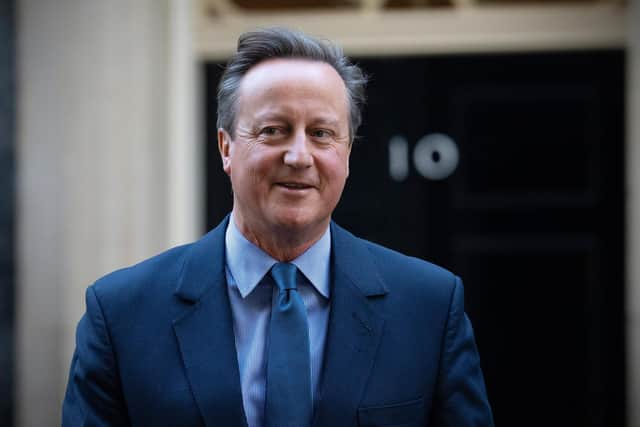David Cameron: Surprise appointment is a gamble that could backfire for Prime Minister
As someone who appeared to be coasting towards a well-remunerated retirement in the Cotswolds thanks to a flurry of consultancies, directorships and speaking engagements, David Cameron will have to hit the ground running on his return to the frontline of British politics.
The new foreign secretary’s most pressing engagements lie in the Middle East, where he must call on all his diplomatic experience to help de-escalate the situation in Gaza. Mr Cameron did not have to contend with the current tensions during his premiership and, although he has spoken forcefully in the past to condemn “illegal” settlements in the region, he has also described himself as a “strong friend of Israel”.
Advertisement
Hide AdAdvertisement
Hide AdAs someone who also worked with the likes of Joe Biden, Vladimir Putin and Xi Jinping during his time in Britain’s highest public office, Mr Cameron will deal with other familiar figures. He has been a staunch supporter of Ukraine and, after seeing Russia’s annexation of Crimea during his premiership, he must deal with an even more aggressive Kremlin.
Domestically, the appointment is being framed by One Nation Tories and Prime Minister Rishi Sunak’s supporters as an example of how he can unite the feuding factions of the Conservative family. On the one hand, Mr Cameron has openly criticised Mr Sunak in the past, most recently on the scrapping of the HS2 northern leg, so the fact he has accepted the post of foreign secretary shows he has faith in the Sunak project.
It would, however, be desperately naive to pretend not to hear the catcalls from the rear pews in the broad church that is the modern Tory party. For all that it is a decision that will ameliorate moderates, those on the right still angered by Mr Cameron’s decision to campaign for remaining in the EU are already sharpening their knives.
True to form, Sir Jacob Rees-Mogg, the former business secretary, has already hurled the cat amongst the pigeons by suggesting Mr Cameron’s appointment may give some Conservative supporters cause to switch allegiance to Reform UK. It is also surely a matter of time before former prime minister Boris Johnson has his say on the latest upheaval.
Even if Mr Cameron and Mr Sunak are able to fend off such criticism, there is no guarantee their united front will last indefinitely. There are key issues around his new post that have to be ironed out, none more so than around international aid. Mr Cameron has been a staunch supporter of the UK retaining its commitment to spending 0.7 per cent of its gross national income on the cause. Indeed, he legislated on the issue. But it is a commitment Mr Sunak has rolled back on.


As things stand, the levels of spending, at half a percentage point, will not see a return to the 0.7 per cent spending level until at least after 2027/28. But now Mr Cameron is in King Charles Street, will the coming Autumn Statement contain any concessions that might accelerate that process, and pacify the Cabinet’s surprise new member? We will find out in a few weeks.
There are broader challenges, too. Perhaps the sternest test facing Mr Cameron – the first former prime minister to serve as foreign secretary since Sir Alec Douglas-Home – is the one that has defined his own legacy so far.
He may be a congenial and well-kent figure on the global stage. But in the eyes of many in the international community, he is still the man who wrenched the UK out of Europe by gambling on the Brexit referendum, only to lose everything. His stature on the international stage is an undoubted asset, but there are many in Brussels, as well as the UK, who regard him as damaged goods.
Advertisement
Hide AdAdvertisement
Hide AdNow that he is back in one of the great offices of state, there will also be questions around potential conflicts of interest, given Mr Cameron’s extensive post-premiership lobbying activities. They include recent addresses in the United Arab Emirates in support of the Chinese-funded Colombo Port City project in Sri Lanka. Critics of the initiative have expressed concern the venture is being bankrolled to bolster Beijing’s strategic influence in the Indo-Pacific.
A spokesman for the former prime minister has previously said Mr Cameron has had no direct contact with either the Chinese government or the Chinese company that funds the port, but given his administration’s determination to encourage trade and investment with China during a so-called “golden period” of relations between the two countries, he can no doubt expect heightened scrutiny of his recent engagements.
There are several other controversies surrounding Mr Cameron that will be seized upon by his opponents both inside and outside the Conservative movement. They include the lobbying row around the collapsed finance company Greensill Capital, the austerity policies he put in place during his time in Downing Street, and the fact he will take a seat in the House of Lords to fulfil his new position.
All will make for an easy target for Sir Keir Starmer and Labour, as well as the SNP, in the run up to the general election. Mr Sunak knows he is making a calculated bet by appointing Mr Cameron. Some may view it as a much needed injection of experience at a time of global turmoil. Others may regard it as a desperate last throw of the dice by a Prime Minister devoid of talent or ideas.
Comments
Want to join the conversation? Please or to comment on this article.